
Nutritional info geeking-out ahead. Just want the homemade lemonade recipe? Use the button above to skip to the recipe card.
I have a sweet tooth just as much as the next person, but I also know that too much refined sugar makes my body feel like a geriatric patient. I avoid it in my everyday diet, but I don’t freak out at the occasional indulgence.
That being said – homemade lemonade is not an occasional indulgence kind of thing – it’s a twice-weekly-in-the-summer kind of thing! It’s perfectly delicious: the perfect mixture of sweet and tart, and excellent as a break from plain water while still hydrating.
When I started switching over to a real, whole foods diet without so much refined junk, I needed to come up with a homemade lemonade recipe that uses whole food ingredients but still tastes amazing. This Homemade Lemonade recipe sweetened with honey accomplishes exactly that!
To be honest, homemade lemonade is ridiculously easy. Classic lemonade is just water + lemon juice + sweetener. Most recipes floating around the web use white sugar, and plenty of it, but I’m really a fan of natural sweeteners wherever possible.
Why Should I Avoid Refined Sugar in my Homemade Lemonade?
The goal of digestion is to break down food into smaller molecules that can be used by various systems in the body (source), so the simpler the molecules in our sugars, the easier it will be for our gut to digest them.
A quick science lesson: sugar is either a monosaccharide (simple molecules like glucose or fructose – like honey), a disaccharide (two simple sugar molecules that are fused together – like cane sugar), or a polysaccharide – like starches). (Source)
My recipe uses honey instead of white sugar for three reasons:
1) Honey is a monosaccharide – it’s comprised of simple glucose and fructose molecules (source), and is thus easier on our digestion.
2) Honey is a natural “sweet and healthy food” (according to this medical study) that also contains vitamins, enzymes, minerals, and other nutrients that benefit the body.
3) In addition to these beneficial components, some research has discovered that honey actually feeds the good bacteria in our guts (otherwise known as a prebiotic), thus helping to balance the microbiome! (Source)
Is Refined Sugar Really That Bad?
Sugar is a hotly-debated topic in the medical and health world. Unfortunately, it’s not often without bias. This study‘s goal was to summarize the current research.
It admits that “consumption of added sugars has been implicated in increased risk of a variety of chronic diseases including obesity, cardiovascular disease, diabetes and non-alcoholic fatty liver disease (NAFLD) as well as cognitive decline and even some cancers” (it links out to multiple other studies dissecting these claims) but then goes on to conclude that “based on high quality evidence… singling out added sugars… appears inconsistent with modern, high quality evidence and is very unlikely to yield health benefits.”
However, if you read to the bottom, you’ll note this little gem tucked into the standard Conflicts of Interest statement: “J.M. Rippe’s research laboratory has received unrestricted grants and J.M. Rippe has received consulting fees from ConAgra Foods, Kraft Foods, the Florida Department of Citrus, PepsiCo International, The Coca Cola Company, the Corn Refiners Association, Weight Watchers International and various publishers.”
You can draw your own conclusions, but I’ll take the word of the dozens of studies linking refined sugar to disease over a single “meh, we’re not convinced it’s bad” argument literally paid for by the processed food and diet industry.
My bottom line? The odd bit of added sugar in your diet won’t kill you, obviously. It probably won’t even have noticeable long-term effects. However, according to the multiple medical studies linked here, excessive sugar consumption can be deadly.
Thus, I diligently avoid it whenever possible and reasonable.
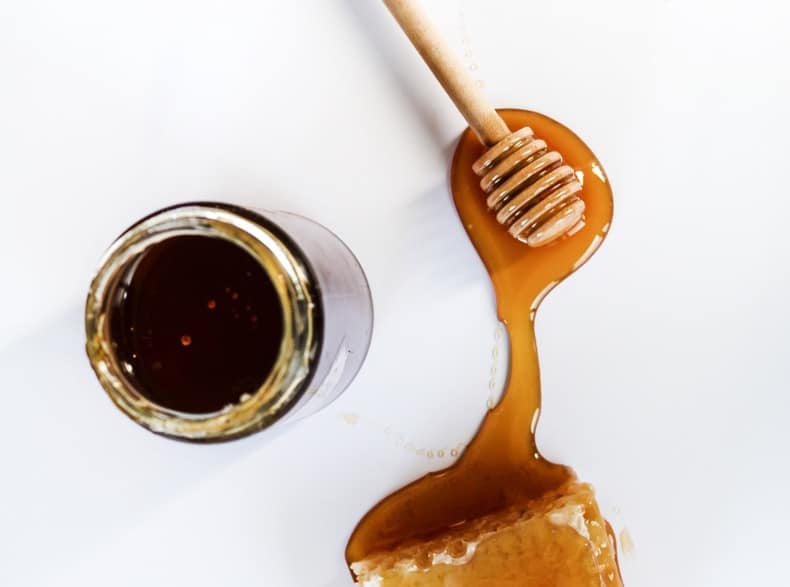
What Kind of Honey Should I Use?
There is actually quite a significant variation in taste of different kinds of honey, and it largely depends on the types of flowers the bees have used to collect nectar.
Most people agree that clover honey is the most mild, followed by wildflower honey, and a few more rare types like orange blossom, and more.
Another simple way to determine whether a honey will have a strong “honeyish” taste is the color: typically the lighter the honey, the milder the taste.
For homemade honey-sweetened lemonade, the milder tasting honey will produce the best results and let the lemon flavor shine through.
Note: I’m normally all about avoiding refined sugar, however in times where I’ve only had a strong-tasting honey on hand, I’ve used a bit less and topped it up with a tablespoon of organic white sugar to help prevent the honey flavor from being overwhelming. It’s a better option than a store-bought lemonade with huge amounts of refined sugar, plus artificial flavors and even artificial colors. If I do decide to do this it’s only for a special occasion, and not for every day.
That being said – that was before I kept stevia on hand, and these days I’d probably just use a bit less honey but add a bit of stevia to top it up.
Bottom line? Homemade with natural sweeteners is better than store-bought any way it comes!
Can I Substitute a Different Sweetener in Homemade Lemonade?
Homemade lemonade tastes great with stevia (a natural sugar substitute that doesn’t raise blood sugar) in place of the honey, and the Keto-friendly sweetener blend that I have on hand works well too (erythritol + monk fruit), but I’d definitely recommend adding a powdered or granulated sweetener to water that was heated first in order to fully dissolve it.
Sweeteners I Wouldn’t Recommend:
Personally, I would not bother trying maple syrup or coconut palm sugar. Both flavors can be quite strong (coconut palm sugar is similar to brown sugar) and they would probably totally overpower the more delicate flavor of the lemon. I haven’t tried those because I hate wasting good ingredients, although you’re welcome to try and report back.
They’re great choices as natural sweeteners in other things, though, like my Salted Caramel Sauce made with coconut palm sugar, and my Grain-Free Maple-Glazed Gingerbread Bundt Cake.
And of course, I do not recommend any of the unhealthy sweeteners that I absolutely never use for any purpose, such as agave, sucralose, splenda, and other artificial sweeteners.
How Long Does Homemade Lemonade Keep in the Fridge?
I’d estimate it would taste great for up to a week, but I’ve never had the chance to really test that because it always disappears the same day I make it! For our family of six I always make a double batch at minimum.
How to Make Honey-Sweetened Lemonade, Step-by-Step with Photos
Step 1: Slice your lemons in half, and juice them thoroughly. This can be accomplished with whatever juicing tool you own.

The juicing can even be done by hand if necessary. Squeeze as much juice out of those babies as you can!
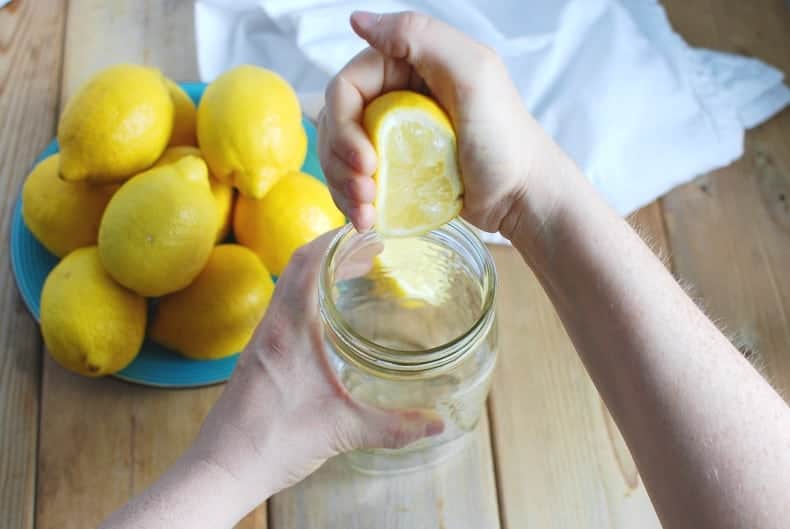
Step 2: Add lemon juice to your pitcher or jar.
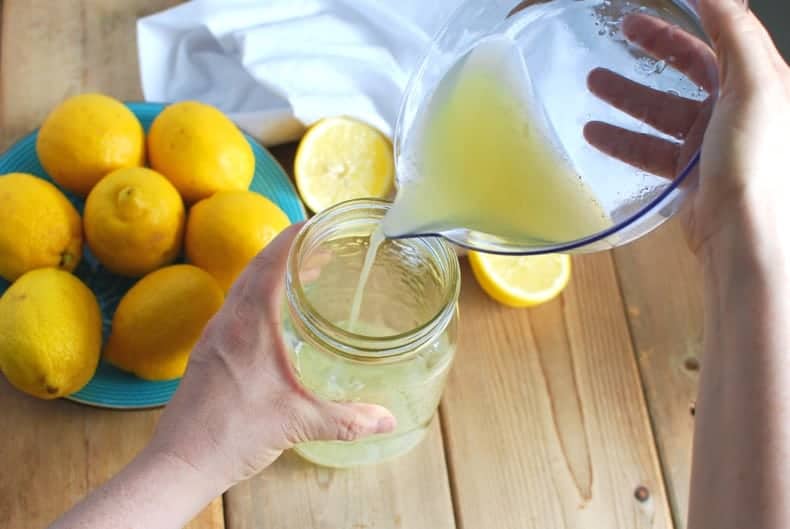
Step 3: Measure honey into a small pot or microwavable glass measuring cup, and heat until it’s a thin, pourable liquid.
You can either add the water to your pot of honey (if heating on the stovetop) and stir that combo into the lemon juice, or you can add the warmed honey and water into the lemon juice directly, one after the other.
I’ve done it both ways, and both are fine. Just be sure to stir right away so that the honey doesn’t clump before it’s mixed.
(Although – if I must give an edge to one method, I think the honey mixes easier if you combine it with the water first, then add that to the lemon juice. I have this method in the recipe card below, but wanted to also note that it’s flexible.)

Step 4: Once all of the ingredients are combined stir well with a whisk. Chill in the fridge and serve.
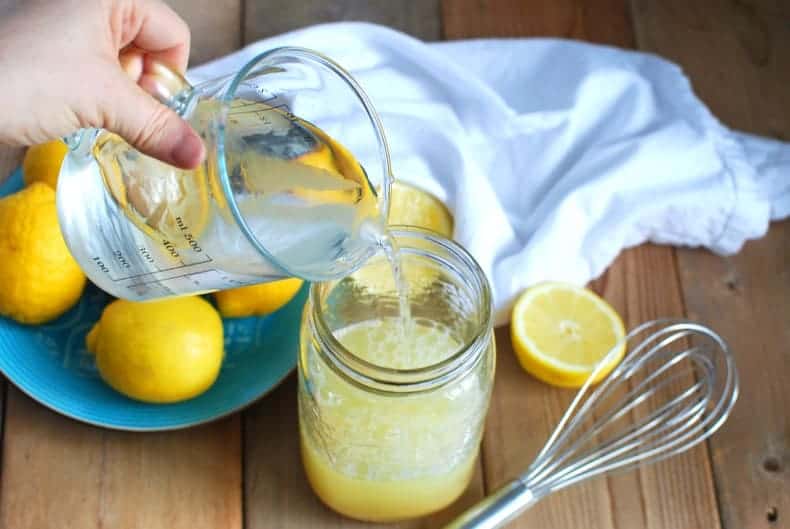
Pro Tip for Hot Summer Days:
Use half of the water called for in the recipe to make a stronger, more concentrated lemonade, then serve over a full glass of ice. This results in a nicely chilled drink that doesn’t get too diluted when the ice melts. Perfect for those super hot summer days!
Homemade Honey-Sweetened Lemonade
Ingredients
- 8 cups Water
- 6 Lemons juiced
- ½ cup Honey (use stevia or other erythritol/monk fruit blend to make it keto – see recommended products in text above.)
- Ice optional
Instructions
- Warm water on stovetop and add honey
- Once honey is dissolved in warm water, remove from heat
- Add juice from 6 lemons (use a strainer when pouring to keep out seeds)
- Pour into pitcher and chill
- Serve and enjoy!
Notes
Nutrition
Sources
- https://www.hopkinsmedicine.org/health/wellness-and-prevention/how-digestion-works
- https://en.wikipedia.org/wiki/Disaccharide
- “Honey for nutrition and health: a review.” J Am Coll Nutr. 2008 Dec;27(6):677-89. Bogdanov S, Jurendic T, Sieber R, Gallmann P.
- Rossano, Rocco et al. “What are the proteolytic enzymes of honey and what they do tell us? A fingerprint analysis by 2-D zymography of unifloral honeys.” PloS one vol. 7,11 (): e49164. doi:10.1371/journal.pone.0049164
- “Effect of Honey in Improving the Microbial Balance” https://academic.oup.com/fqs/article/1/2/107/3860141
- Rippe, James M, and Theodore J Angelopoulos. “Relationship between Added Sugars Consumption and Chronic Disease Risk Factors: Current Understanding.” Nutrients vol. 8,11 697. 4 Nov. 2016, doi:10.3390/nu8110697
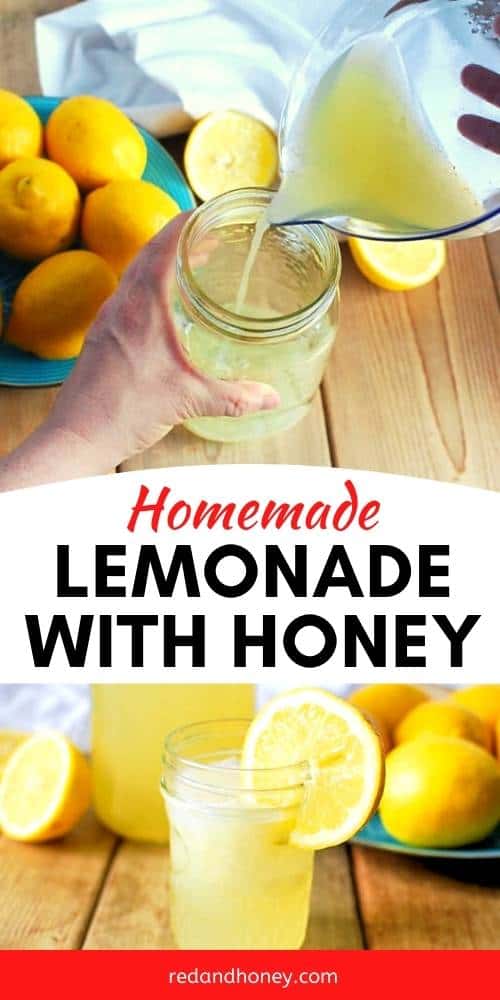



Rabia
Hi Beth!
I really like the recipe, it’s so refreshing. I also have a sweet tooth but always try to avoid sugar. I prefer adding dates in smoothies and honey in drinks like, lemonade or mint margarita.
Sue
How much stevia if using that instead of honey???
Beth
I’d just add a small amount to start, and increase to your personal taste. If you’re using powder, start very small – like a 1/2 tsp per batch of lemonade.
Phillip Longley
Dear Beth,
Hello there! I am going to make a home made lemonade with Hamilton honey from Hamilton City NZ & organic Lemons & Pump water which was bottled in Putaruru New Zealand.
хостинг в украине
Woah this blog is magnificent i really like reading your posts. Stay up the good paintings! You realize, a lot of persons are searching round for this info, you can aid them greatly.
tanya
I like to add a bunch of fresh mint leaves to my homemade lemonade…..so refreshing!
Andrea B
I don’t remember specifically, but I doubt the peel was included. I would add a little piece of peel for flavor, I think, but otherwise, just the lemon half without the peel.
Melissa E
Sounds Good! I have been making the fermented Hindu lemonade. Not sweet but definitely refreshing! Instead of the honey add 1/2 a cup of rapadura or succant. 1/2 cup liquid Whey (home made from raw milk)1/2 tsp nutmeg. Leave on counter 2 days then transfer to fridge and drink! The sugar gets eaten as it ferments and produces good bacteria for your digestive system!
Melissa E
and 2 quarts of filtered water and 6 lemons juiced! Has to be fresh lemons!
Heidi
That sounds amazing! Do you use the 6 lemons and 8 cups of water?
Stacy @Stacy Makes Cents
I just wanna tell you that I love the button you made. 🙂
Beth
Ha! You mean the photo at the top? Thanks, girl! 😀
Stacy @Stacy Makes Cents
Yes – isn’t that called a button? If not, that’s what I call it. LOL
Kristen (Smithspirations)
Super easy! Love it!
I’ve started making water kefir and have been adding lemon juice to finish it. We really like that, too!
Beth
We have done the SAME THING! And it tastes pretty well the same as regular lemonade – LOVE it. We just started brewing water kefir a few months ago, and it’s awesome 🙂 What other flavours do you like? I like grape, but am not a fan of pomegranate.
Andrea B
I saw a recipe using ice, white grapes and a lemon is a vitamix (other high-powered blenders likely work, too). I want to try that one day. Less sugar, more fiber–but I love honey! I only sweeten with honey, dates, or stevia.
Beth
Interesting!! Do you mean the recipe called for the entire lemon, including the peel??